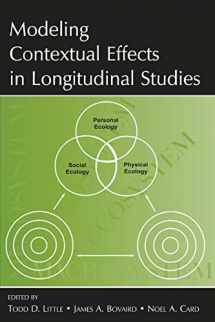
Modeling Contextual Effects in Longitudinal Studies
Book details
Summary
Description
This volume reviews the challenges and alternative approaches to modeling how individuals change across time and provides methodologies and data analytic strategies for behavioral and social science researchers. This accessible guide provides concrete, clear examples of how contextual factors can be included in most research studies. Each chapter can be understood independently, allowing readers to first focus on areas most relevant to their work. The opening chapter demonstrates the various ways contextual factors are represented―as covariates, predictors, outcomes, moderators, mediators, or mediated effects. Succeeding chapters review "best practice" techniques for treating missing data, making model comparisons, and scaling across developmental age ranges. Other chapters focus on specific statistical techniques such as multilevel modeling and multiple-group and multilevel SEM, and how to incorporate tests of mediation, moderation, and moderated mediation. Critical measurement and theoretical issues are discussed, particularly how age can be represented and the ways in which context can be conceptualized. The final chapter provides a compelling call to include contextual factors in theorizing and research.
This book will appeal to researchers and advanced students conducting developmental, social, clinical, or educational research, as well as those in related areas such as psychology and linguistics.


We would LOVE it if you could help us and other readers by reviewing the book
Book review



